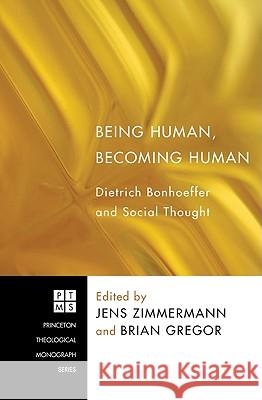Being Human, Becoming Human: Dietrich Bonhoeffer and Social Thought » książka
Being Human, Becoming Human: Dietrich Bonhoeffer and Social Thought
ISBN-13: 9781608994205 / Angielski / Miękka / 2010 / 258 str.
Being Human, Becoming Human: Dietrich Bonhoeffer and Social Thought
ISBN-13: 9781608994205 / Angielski / Miękka / 2010 / 258 str.
(netto: 137,85 VAT: 5%)
Najniższa cena z 30 dni: 142,75
ok. 16-18 dni roboczych.
Darmowa dostawa!
Description: Who are we? What does it mean to be human? What is the purpose of our existence? In our time these continue to be urgent questions. The German theologian Dietrich Bonhoeffer thought deeply about these questions out of a desire to understand the importance of Christ and the incarnation for modern culture. His conviction that Christ died for a new humanity is at the core of his theological anthropology. Bonhoeffer's Christ-centered, Trinitarian theology establishes the intrinsic sociality of humanity as made in the image of God. Being Human, Becoming Human assembles a distinguished and international group of scholars to examine Bonhoeffer's understanding of human sociality. From the introduction of his dissertation, Sanctorum Communio, where he notes ""the social intention of all the basic Christian concepts,"" to his final writings in prison, where he describes Christian faith as being for others, the theme of human sociality runs throughout Bonhoeffer's works. This theme links Bonhoeffer with contemporary concerns in theology, philosophy, cultural studies, and science regarding human reason, human nature, and their socio-cultural expressions. Vital reading for Bonhoeffer scholars as well as for those invested in theological debates regarding the social nature of human being, the essays in this volume examine Bonhoeffer's rich resources for thinking about what it means to be human, to be the church, to be a disciple, and to be ethically responsible in our contemporary world. Endorsements: ""This collection of essays by distinguished scholars provides new insights into the meaning of Christian humanism that avoids the pitfalls of individualism on the one hand and collectivism on the other hand. An excellent book for all who seek to affirm the human in an increasingly dehumanizing global context."" --Ralf K. Wustenberg Professor of Religious Studies, University of Flensburg, Germany ""This collection, written by leading Bonhoeffer scholars, deals with an element of Bonhoeffer's anthropology which, in our times of individualistic thinking, is more relevant than ever: how Christ is the foundation for a life in responsible relations."" --Christiane Tietz Chair for Systematic Theology, Evangelisch-Theologische Fakultat, University of Mainz, Germany About the Contributor(s): Jens Zimmermann holds a Canada Research Chair at Trinity Western University. He is author of Recovering Theological Hermeneutics (2004) and coauthor of The Passionate Intellect (2006). Brian Gregor holds a PhD in philosophy from Boston College. He is the author of several articles on philosophy of religion, ethics, and aesthetics, and the coeditor (with Jens Zimmermann) of Bonhoeffer and Continental Thought: Cruciform Philosophy (2009)."
Description:Who are we? What does it mean to be human? What is the purpose of our existence? In our time these continue to be urgent questions. The German theologian Dietrich Bonhoeffer thought deeply about these questions out of a desire to understand the importance of Christ and the incarnation for modern culture. His conviction that Christ died for a new humanity is at the core of his theological anthropology. Bonhoeffers Christ-centered, Trinitarian theology establishes the intrinsic sociality of humanity as made in the image of God.Being Human, Becoming Human assembles a distinguished and international group of scholars to examine Bonhoeffers understanding of human sociality. From the introduction of his dissertation, Sanctorum Communio, where he notes ""the social intention of all the basic Christian concepts,"" to his final writings in prison, where he describes Christian faith as being for others, the theme of human sociality runs throughout Bonhoeffers works. This theme links Bonhoeffer with contemporary concerns in theology, philosophy, cultural studies, and science regarding human reason, human nature, and their socio-cultural expressions.Vital reading for Bonhoeffer scholars as well as for those invested in theological debates regarding the social nature of human being, the essays in this volume examine Bonhoeffers rich resources for thinking about what it means to be human, to be the church, to be a disciple, and to be ethically responsible in our contemporary world.Endorsements:""This collection of essays by distinguished scholars provides new insights into the meaning of Christian humanism that avoids the pitfalls of individualism on the one hand and collectivism on the other hand. An excellent book for all who seek to affirm the human in an increasingly dehumanizing global context.""--Ralf K. WüstenbergProfessor of Religious Studies, University of Flensburg, Germany""This collection, written by leading Bonhoeffer scholars, deals with an element of Bonhoeffers anthropology which, in our times of individualistic thinking, is more relevant than ever: how Christ is the foundation for a life in responsible relations.""--Christiane TietzChair for Systematic Theology, Evangelisch-Theologische Fakultät, University of Mainz, GermanyAbout the Contributor(s):Jens Zimmermann holds a Canada Research Chair at Trinity Western University. He is author of Recovering Theological Hermeneutics (2004) and coauthor of The Passionate Intellect (2006).Brian Gregor holds a PhD in philosophy from Boston College. He is the author of several articles on philosophy of religion, ethics, and aesthetics, and the coeditor (with Jens Zimmermann) of Bonhoeffer and Continental Thought: Cruciform Philosophy (2009).











